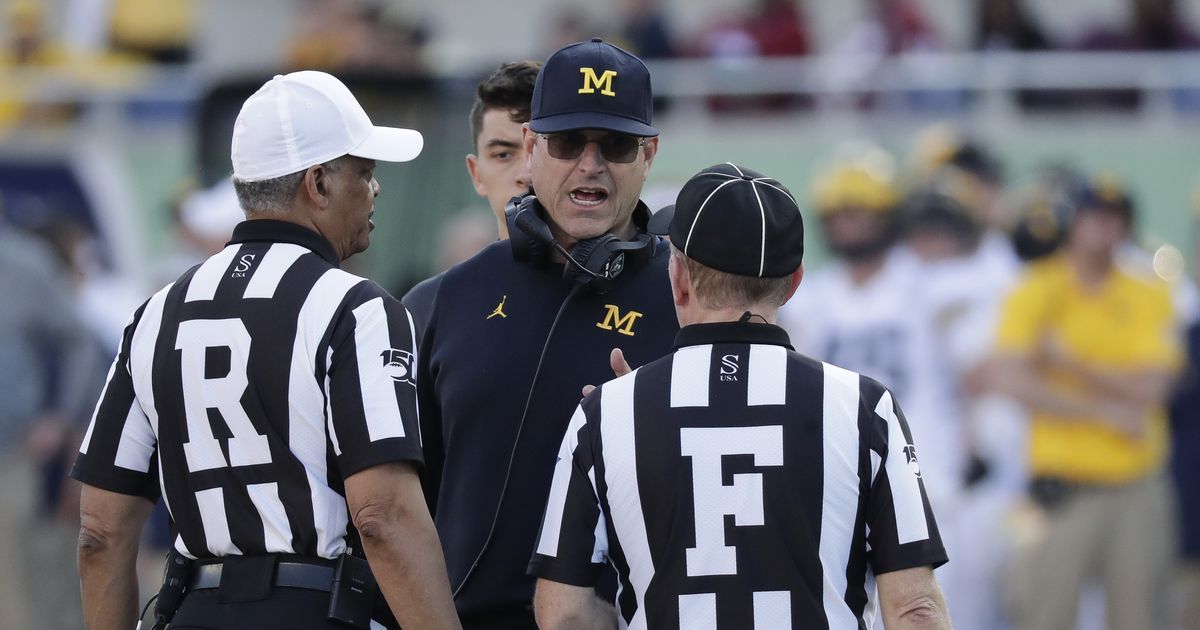Jim Harbaugh proposes one-and-done rule change for NFL draft


ANN ARBOR, Mich. (AP) — Michigan coach Jim Harbaugh is pushing for a change that would allow football players to enter the NFL draft after one year in college.
“My first proposal is that we put this decision to `go or stay’ in the hands of the individual and his family, not in the form of an NFL, NFLPA or NCAA rule while allowing the player to return to college football if he does not sign,” Harbaugh wrote in an open letter to the football community Thursday.
Currently, players are not eligible for the NFL draft until they have been out of high school for at least three years.
“The proposal described above would allow the individual to pursue his dream as a student and as a professional athlete in the time frame that best suits his best interests of his own free will and ability,” Harbaugh wrote.
A policy in the collective bargaining agreement — which runs through the 2030 season — between the NFL and the players’ union prohibits players who have completed only their first or second years in college to be drafted. That rule has not been challenged for nearly 17 years. The league and the union, meanwhile, have shown no inclination of revising the rule.
“We have great respect for coach Harbaugh and appreciate that he offered his opinion,” NFL spokesman Brian McCarthy said.
Former Ohio State running back Maurice Clarett sued the NFL in 2003, shortly after being suspended for receiving extra benefits and misleading investigators, to challenge it.
Clarett was ruled eligible for the 2004 draft by a U.S. District Judge in New York, but a federal appeals court put that ruling on hold and the U.S. Supreme Court refused to intervene. In 2005, the Denver Broncos drafted Clarett in the third round, cut him before the season, and he didn’t play in the NFL.
Harbaugh also proposes a rule change that would allow undrafted players, who don’t sign with a team in the league to return to compete in college if they stay academically eligible and do not get money from an agent.
He also suggests schools cover the costs of a completing a degree for a player who leaves school prior to graduating to enter the draft and stays in the league.
If a student-athlete left after his freshman season or a fourth season, according to Harbaugh’s proposal, he would be eligible to have one year of his continuing education paid for by the school. If the player went pro after his second or third year in college, Harbaugh suggested he would be entitled to an additional two years of his education
Harbaugh’s proposals also include “broadening of the rules,” to allow student‐athletes and their families to get advice from attorneys and agents without getting paid.
He also suggests eliminating the redshirt rule by giving all football players five years to compete. He wants coaches to be allowed to add more than 25 incoming freshmen and transfers each year.
Harbaugh previously championed a possible NCAA rule change that would allow all student-athletes to transfer one time without sitting out a season.
A former NFL quarterback, Harbaugh returned in 2015 to the school where he was a star after going 44-19-1 as coach of the San Francisco 49ers and winning the 2012 NFC championship.
Harbaugh thanked his father, Jack, a former football coach; athletic director Warde Manuel and school president Mark Schlissel for discussing his ideas with him.
“These views are my own and are not necessarily those of the University of Michigan,” Harbaugh wrote.







